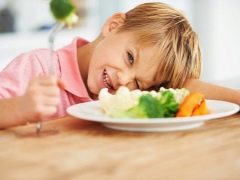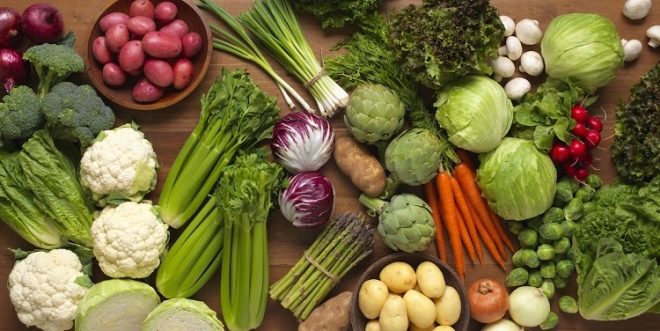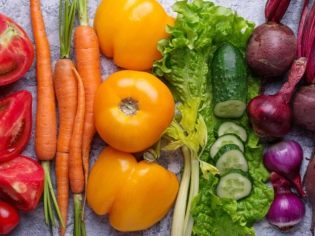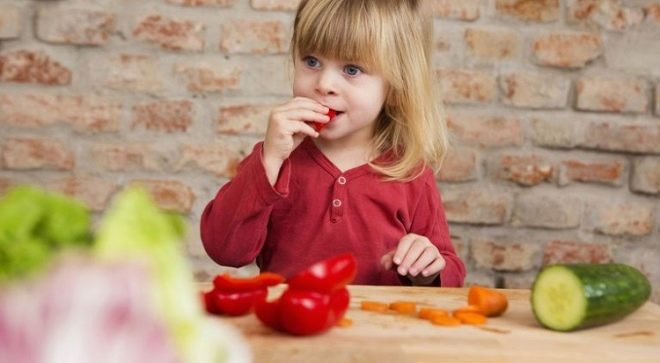What if the child does not eat vegetables?
The benefits of vegetables for the human body is great and can not be doubted. Vegetables - these are vitamins, minerals, this is valuable fiber, which is so necessary for the intestines and stomach to improve digestion, prevent constipation, and normalize metabolism. For a child who grows and develops, the need for vitamins, minerals, as well as in normal digestion, is even higher than in adults. But, unlike them, a child can be extremely difficult to feed on vegetables and vegetable dishes.
In this article we will look at why some children do not like vegetables so much and can they do something about it.
The reasons
First you need to clearly understand that the rejection of vegetables is not a disease and not a pathology. There are very many children who cannot be lured to the table if there are any vegetables there. Before deciding how to teach a child to eat healthy and rather tasty vegetables, you need to figure out what prevents him from doing so at this point in his life.
The most common causes of children's abandonment of vegetables lie in the following.
- Food Neophobia. Under this term, doctors and psychologists mean the fear of new food. This fear is quite natural, due to evolutionary processes, conceived by mother nature in order to save a living organism from eating everything that can be dangerous. New - unfamiliar, and therefore potentially dangerous.
- Untimely lure. Scientists say that certain baby food preferences are formed in the prenatal period of development. What a pregnant mom loves is consumed by a child. But these preferences are intuitive, the baby does not give itself a report on them.
But the first year of life is very important for the formation of tastes. If the baby was not injected with vegetables in the form of mashed potatoes for baby food after six months, and preferred sweet mashed potatoes, curds, juices, then after their rich tastes, the taste of vegetables may seem to the child faded, dull and unworthy of his attention.
- Vegetables and dishes from them look tasteless, ugly. Visual signals, and any physiologist and child psychologist will confirm this to you, are of particular importance to a child. Adults can eat ugly food with a solid understanding that it is tasty and healthy. A child can be long to tell how it is tasty and useful, but if it looks unattractive, it does not even touch to try and evaluate yourself. Therefore, by the way, kids love fast food so much, because it is beautiful, appetizing, and boiled beets do not.
- Don't like the taste - This is the problem of improper organization of food and untimely schooling of vegetable dishes, as mentioned above. Also, this problem is faced by families in which there is no great love for vegetable diet among adults. If a child sees with what pleasure adult members of the family absorb meat, sweets, mayonnaise, then he simply has no chance to love carrots and cabbage.
- Monotony ration. If a mother doesn’t bother herself with new recipes from familiar products and gives her child a familiar dish every day that even looks exactly the same as a few days ago, you shouldn’t expect vegetables to give your child pleasure. Like old toys, even if interesting, familiar dishes can get bored.
- Dictatorship and coercion. Sometimes a child does not eat vegetables, not because he does not like them or is bored. The reason may lie in the utter disgust that he feels for them.Such aversion is rather quickly and easily formed not only to the vegetable menu, but also to any kinds of food, even sweets, if the child is forced to eat them against his will.
Also remember carefully if the baby has had any negative experiences with vegetables. For example, he burned hot potatoes or cauliflower, ate beetroot salad, and then he was nauseated with this beetroot (the cause of nausea may not be at all in the beetroot, but persistent rejection in such situations usually forms for a long time).
What can be done?
The best that can be done for the child, so that later he would not have problems with the use of vegetable food - from the earliest age allowed to accustom him to such food - from six months.
If the problem is still formed, it is easier to say what cannot be done if the child does not want vegetables. You can't make him eat them.
After establishing the cause of child failure, it is necessary to proceed to action.
- Allow the child to choose what is. Provide the same choice regarding vegetables - a tomato or a cucumber? Carrot or cauliflower?
- Mix vegetables in a small rubbed form with the food that the child eats without problems. So, a shabby piece of cucumber can be perfectly added to the vermicelli, and the child is unlikely to find a “substitution”. Vegetables can be finely chopped and added with this form in the gravy from goulash, in the soup.
- No need to try to feed at any cost. If the child does not want to eat, do not even try to seat him at the table in the hope that "maybe something will swallow it." When a baby gets hungry, he will ask for food himself, besides, it is possible that a hungry child will be more supportive to a vegetable salad on a plate.
- You should not encourage eating a vegetable dish with the promise of dessert, as many parents do - “eat a carrot - I will give candy”. Sweetness after a vegetable dish eaten through the power of “benefit for the sake of” will only emphasize the contrast of tastes which is clearly not in favor of vegetables.
- If the child is not allergic, add a small amount of herbs and spices to the dishes, so that the taste of vegetables is more attractive.
The child is better to offer vegetables at the beginning of dinner or lunch. If he does not love them, then you can play on the feeling of hunger, because after the soup or the second one, he definitely will not eat a healthy vegetable.
- Show your imagination - combine multicolored vegetables, decorate ready-made dishes with them, serve them beautifully to your child, cut cheburasheks and smeshariki from carrots, and turn cabbage into a luxurious sailboat. There is a lot of information on how to do this.
- Attract “nehuchuha” to cooking - let him try to cut a bright pepper or tomato by himself, prepare vegetable stew with him, entice the child with “decoration” of ready-made vegetable dishes.
- Come up with fairy tales and heroic stories in which a vegetable unloved by a child will act as a superhero or help such heroes. Believe me, this will be an excellent platform for the upcoming new attempt to offer the kid the very “heroic vegetable”.
Opinion of Dr. Komarovsky
Doctor of Medical Sciences, beloved moms and grandmothers pediatrician Yevgeny Komarovsky argues that the big problem is that a child refusing vegetable dishes for up to a year is not. At this age, the tastes of children largely depend on the needs of the body in certain substances. But after a year, parents should make sure that the whole family (including toddlers) on the table always had fresh and thermally processed vegetables.
Good advice from Komarovsky is to replace all the snacks on vegetables. It’s no secret that all the kids like to grab the “pieces” from the table, but if the mother offers not a sandwich and not cookies as a snack, but a piece of fresh carrots, a leaf of lettuce, a piece of cabbage stalk, cucumber, then the correct food habit will be formed, and the need to “grab” the pieces does not hurt.
Proper nutrition
Vegetables should be the first food in the child's life.It is with them, and not with sweet fruit purees, that pediatricians are recommended to begin their acquaintance with the world of tastes. Vegetable puree, consisting of only one component - an ideal option to start feeding. Initial dosage for a baby is no more than a third of a teaspoon. In the absence of an allergic reaction and intestinal "misunderstandings" the amount can be gradually increased. It does not make much difference whether mother will prepare vegetable purees herself or buy a ready hypoallergenic dish in a jar created especially for babies. The main thing is to feed the child pleasure.
Many people worry that vegetables will cause allergies in infants, and therefore they are slow to introduce a vegetable menu, but these fears are completely unjustified. It will be easy to determine the inadequate reaction of a child’s body to one or another vegetable, and if it appears, then together with the pediatrician you can always make the right decision about the feasibility of a particular product. Besides supplements are always recommended from vegetables that are less likely to cause allergic reactions. These include cauliflower, zucchini, cucumbers. If these products are well tolerated, then you can add vegetables of medium allergenicity - peas, pumpkin, potatoes. Vegetables that are more likely to develop allergies, add last, preferably after a year - beets, tomatoes, carrots.
For a child of any age after the year in the total mass of food that he consumes per day, vegetables should be at least one third of the diet. It is important that the digestive organs work more smoothly, so that enough vitamins are supplied with the food to the growing little man.
Non-standard situations
Changing tastes can be attributed to a non-standard situation, for example, if one does not feed the child with vegetable dishes, although he used to eat them well and with pleasure. Often this happens with children in 2 years, in 3 years.
Usually, the reason why the baby stopped eating vegetables lies in some important changes in his life, for example, at the beginning of his kindergarten visit. In the kindergarten kitchen, vegetables are prepared differently. And it is possible that the child did not like this method. Then he automatically transfers the new perception of the usual pumpkin or cucumber to the home kitchen and begins to refuse what he had eaten with pleasure.
In this situation, parents are advised to wait a bit. After the end of the adaptation process to the new conditions, the basic taste tastes usually return and the child again recalls that it is tasty.
In the next video, Dr. Komarovsky finds out how easy it is to teach children to eat vegetables and fruits.






















